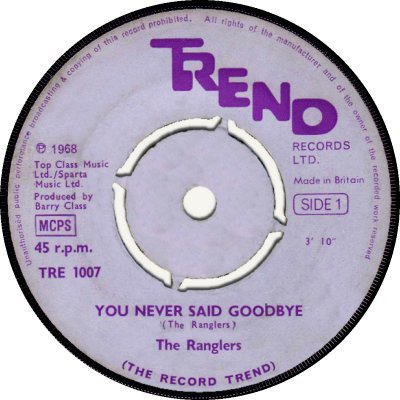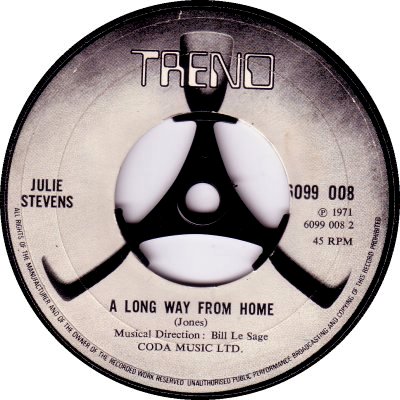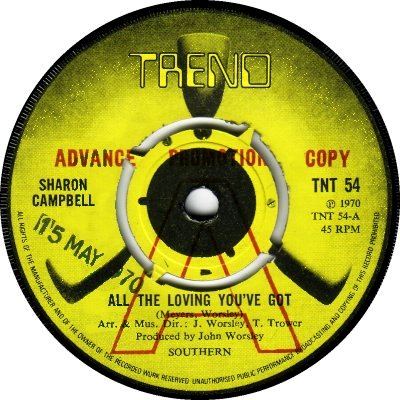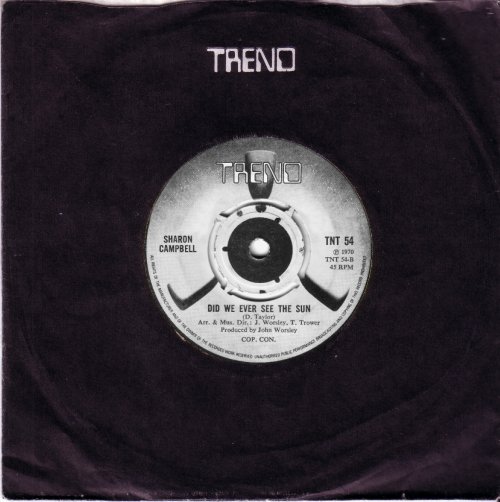




A moderately obscure label, owned by London record dealer and artist manager Barry Class. 'Record Retailer' of the 3rd of January 1968 announced that the new label was to operate from Class's 'Disci' record shop in Westbourne Grove; its first single was to be 'Fanny Adams' by the Ways & Means, and Saga (q.v.) was to handle distribution. The catalogue number of the single was to be TRE-1004. A couple of weeks later came the news of a change of plans: instead of 'Fanny Adams' the Ways & Means single was now to be 'Breaking Up A Dream'; 'Speak To Me' by The Explosions (TRE-1005) was to be issued on the same day, with The Ranglers' 'Step Down' following on the 23rd of February ('RR', 17th January). Again, however, there were changes: when 'Breaking Up A Dream' come out, on February the 9th, it was numbered TRE-1005 and was accompanied by The Ranglers' single - 'Speak To Me' seems to have remained unissued. 'RR' of the 12th of February carried an advert for the first two singles, and the issue of the 21st offered some comments from Barry Class. According to the article he started his first Disci shop in September 1965 and moved into artist management in 1967 - he managed The Foundations. He is quoted as saying that he turned to Saga Associated to handle Trend because he had great faith in the budget market, and his company's first LPs were intended to be budget ones. With Trend, he added, he "would be able to fully exploit the talents of my artists," and he would be able to produce and choose issues himself. "Being a record dealer has given me valuable assistance - I know exactly what the public wants and I think I know how to give it to them," he said, and finally added that time would tell if that was the case.
Catalogue numbers were initially in a TRE-1000 series but for some reason the majority of them seem not to have been used: the third (and last) TRE single to be released was TRE-1010, 'The Magical Musherishi Tours' b/w 'Mister D.J. Man' by Morris & Mitch, which came out in April - it was reissued on the Saga Trend label later in the year, as STR-1010. These early singles had pale blue labels with a purple logo, and they are very collectable nowadays; the example shown (1) comes by courtesy of the 45 cat site. After this initial burst of activity there appears to have been a lull. Things picked up again towards the end of 1969: 'Record Retailer' of the 15th of November reported that songwriters John Worsley and David Myers had left Southern Music to join Class at Trend. Then a month or so later came the news that Class intended to revive his label. The article quoted him as saying that after the first few releases Trend had functioned mainly as a production company but he intended to build it up again. The first release would be in January of the following year, and distribution would be by Pye ('RR'; 13th December 1969).
Trend was duly relaunched in January 1970, with Pye handling manufacture and distribution. The numbering changed to a TNT-50 series and a new label design was adopted; it featured something that I always thought was a ceiling fan but is in fact - more appropriately - a tape reel (2). In Pye's house fashion, demo copies had yellow labels and the appropriate marking (4). Trend only stayed with Pye for twelve months: 'RR' of the 10th of October said that the label was to move to Philips before the end of the year, under a three-year manufacturing / marketing / distribution deal. The move took place, and from December 1970 Trend singles were numbered in one of Philips's seven-figure series, 6099-000. The label design remained unchanged, but Philips's habit of dinking the centres of its singles played merry hell with it (3). The 'three-year' deal mentioned in 'RR' appears to have ended up as a two-year one, for 'RR' of the 6th of November 1971 revealed that negotiations between the two companies had not finished, and that, pending a satisfactory conclusion, singles by The Foundations and by Julie Stevens were to be issued on MCA instead of Trend. A week later came a report that the deal with Philips had ended; Barry Class was quoted in the article as denying rumours that he intended to quit the entertainment business ('RR'; 13th November). That was the last that was heard of Trend in the trade paper until 1973 when RR's successor 'Music Week' noted that the company had been wound up compulsorily in the High Court, with Pye and another creditor as the petitioners ('MW'; 28th April 1973). The article gave the company's address as 6, Porter Street, London W1. Trend never had any hits, but its Jazz-Rock-flavoured LPs by Warm Dust and Swegas are beginning to command respectable prices nowadays.



Copyright 2006 Robert Lyons.

